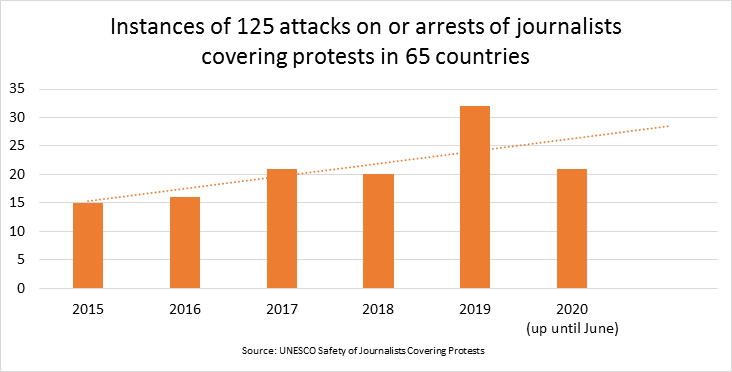UNESCO Warns Of Rising Global Abuse Against Journalists
There has been a sharp escalation during the first half of 2020 where police and security forces have violated media freedom during protests around the world, a UNESCO report has said.
The report found that since 2015, 10 journalists have been killed when covering protests, a figure which includes Lyra McKee who was shot dead while observing a protest in Derry in April 2019.
Twenty-one protests around the world have involved violations of press freedom, in which journalists have been attacked, arrested and even killed. UNESCO has identified 125 attacks on, or arrests of journalists in 65 countries since 2015.

The report highlights an increasing trend in the use of unlawful force by police and security forces over the last five years. In 2015, journalists covering 15 protests worldwide were hindered by the police and security forces. By 2019, that number increased to 32.
The report also reveals that “participants in protests, as well as security force members, have harassed journalists including by physically stopping them from reporting, as well as by damaging their equipment, and by briefly detaining journalists.”
The report shows a disturbing, growing threat to media freedom and freedom of access to information around the world.
UNESCO director-general Audrey Azoulay said: “Journalists have a critical role in reporting and informing audiences on protest movements.
“For many years, UNESCO has been raising global awareness to ensure that they can do this safely and without fear of persecution, and training security forces and the judiciary on international norms in freedom of expression.
“The figures in this report show that much greater efforts are needed. We call on the international community and all relevant authorities to ensure that these fundamental rights are upheld.”
UNESCO calls for better protections for journalists, which includes strengthening police and law enforcement training on freedom of expression and behaviour in dealing with the media; providing training and equipment to journalists and freelancers sent to cover protests; appointing national overseers to hold police responsible for the use of force against journalists during demonstrations; and reinforcing national mechanisms for the safety of journalists.
The full report can be found here.